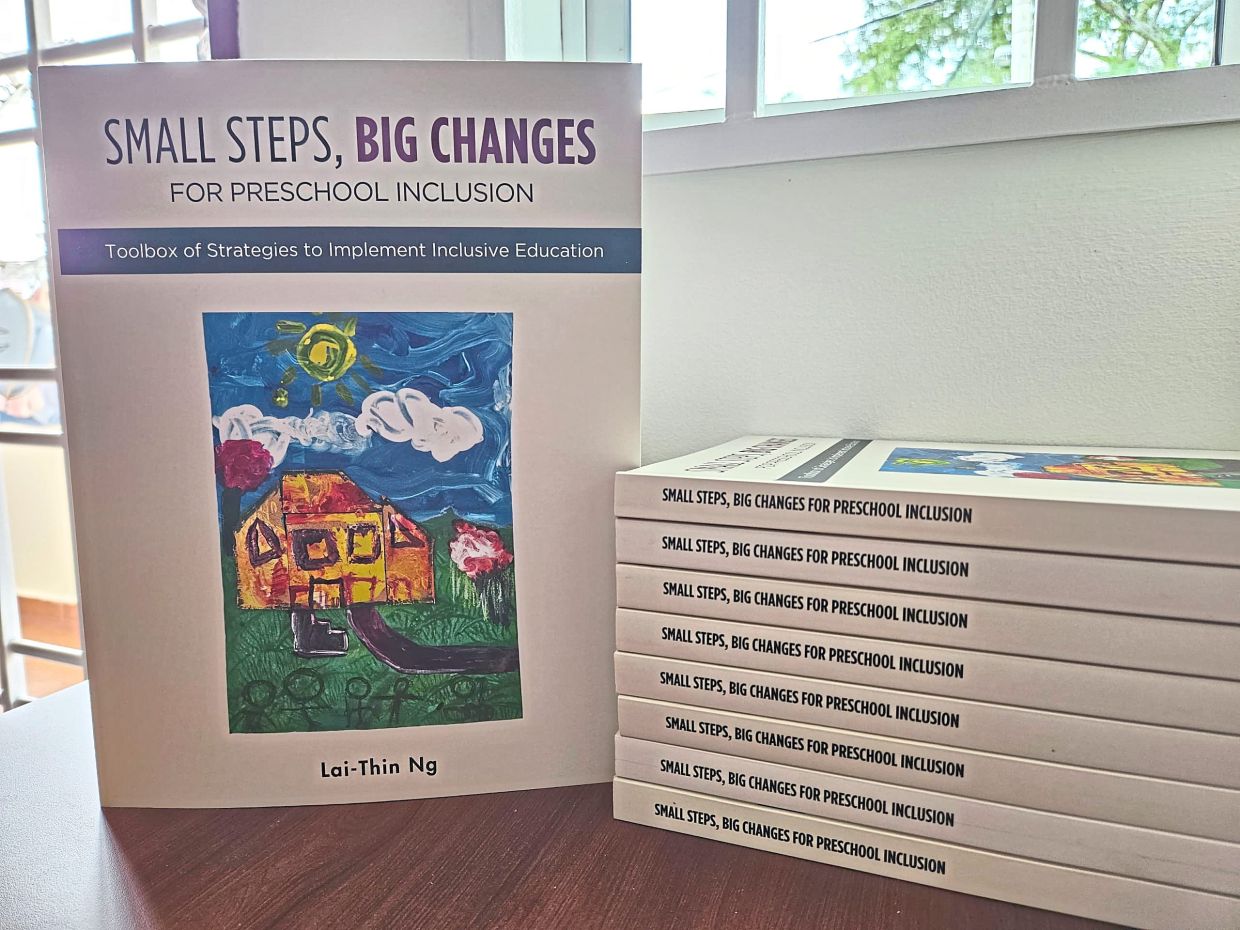This guidebook addresses the challenges and opportunities for an inclusive education in the country. Photo: Lai-Thin Ng
In Malaysia, getting preschool education in mainstream setting is a challenge for children with developmental delays and disabilities.
This issue and its possible solutions are discussed in Lai-Thin Ng’s guidebook, Small Steps, Big Changes for Preschool Inclusion.
Growing up with a neurodivergent sibling, Ng wrote the book to address the need for inclusive education within mainstream preschools in Malaysia.
“My mother knew that a traditional classroom was the best environment for my brother to learn in but the education system in conventional preschools are not designed to include children with disabilities, so it was difficult,” she says.
“Children with disabilities belong in our society and separating them because the mainstream system does not include them is not the proper course of action.”
The 35-year-old says that she also wrote the book to introduce useful tactics for preschool teachers.
“In our line of work, we hear from preschool teachers about their lack of skills, knowledge and confidence to teach children with disabilities... this book was written to give early childhood educators some practical strategies to address those issues,” she adds.
Rethinking disability in education
As project lead for the National Early Childhood Intervention Council (NECIC), Ng says that a comprehensive approach to preschool instruction must be implemented by the early childhood education system.
“While some preschools are dedicated to fostering inclusive education, most are only doing integration – where kids blend in with their surroundings without receiving the assistance they need to truly participate in class,” she says.
Ng states that individuals who work in early childhood education need to be willing to rethink the assumptions they have about disability.
“It’s all about keeping an open mind and heart and committing to doing what is right for disabled children,” she says.
Ng also notes that teachers in the field should also be allowed the room they need to effectively facilitate learning and controlling young children’s emotions.
This change is essential because natural learning environments are designed to provide many learning opportunities.
“Many children with disabilities will begin their education by attending preschool and most of them are either undiagnosed or have yet to be diagnosed,” she continues.
The early childhood education industry, therefore, must anticipate this and create inclusive preschools in order to meet the various learning requirements of every kid.
Additionally, creating an inclusive and equitable learning environment is also beneficial to Malaysian children.
Apart from meeting, learning and interacting with their peers who look, behave and communicate differently, they will also have less fear of human differences. “An inclusive learning environment will lead to better social and emotional development in children,” Ng says.
“They learn to be more understanding towards people with disabilities... it becomes natural and automatic for them.”
Unlearning harmful practices
While writing Small Steps, Big Changes for Preschool Inclusion, Ng discovered that insisting compliance through punishment and rewards – like special tokens and sticker charts – can be a harmful practice to instil in children.
“When I was doing research for my book, I discovered that the act of winning something loses significance for children when the prize seems forceful or patronising,” she says.
“These are some of the behaviours that educators should unlearn even if the process is challenging.”
Certain chapters, she adds, such as supporting challenging behaviours, was a daunting task for Ng to write about.
“I made it my goal to give this book justice while also examining it through a neurodiversity-affirming lens,” she says.
She also emphasises the need for local authors to write books like these, as early childhood education strategies from other countries may not translate into Malaysia’s existing legal, structural and cultural factors.
“This is due to the absence of collaboration between early intervention practitioners and preschool teachers, since there is no direct communication channels and sufficient funding,” Ng explains.
Parental initiative
Parents must also take the initiative to advocate for their children by acting as the main connecting person between professionals and preschool teachers.
While Small Steps, Big Changes for Preschool Inclusion is written for the classroom, there are also strategies applicable to other settings, especially the different types of adaptation.
“The chapters on supporting challenging behaviours, creating a positive learning environment, creating social stories and visual tools will also be beneficial to readers with or who are around disabled children,” Ng says.
Ng hopes that after reading her book, adults will provide disabled children with more learning chances, particularly for skills that they were conditioned to believe were impossible for them to do.
She also wishes that those in early childhood education would anticipate the different needs and preferences to learning, and give meaningful options for children to participate in multiple ways.
Ultimately, she wants readers to unlearn compliance-based practices towards children with disabilities and instead, focus on helping them to feel safe through co-regulation and trusting relationships.
“Disability needs are just like any human needs, it is not something special and it is not something to be afraid of,” Ng concludes.





